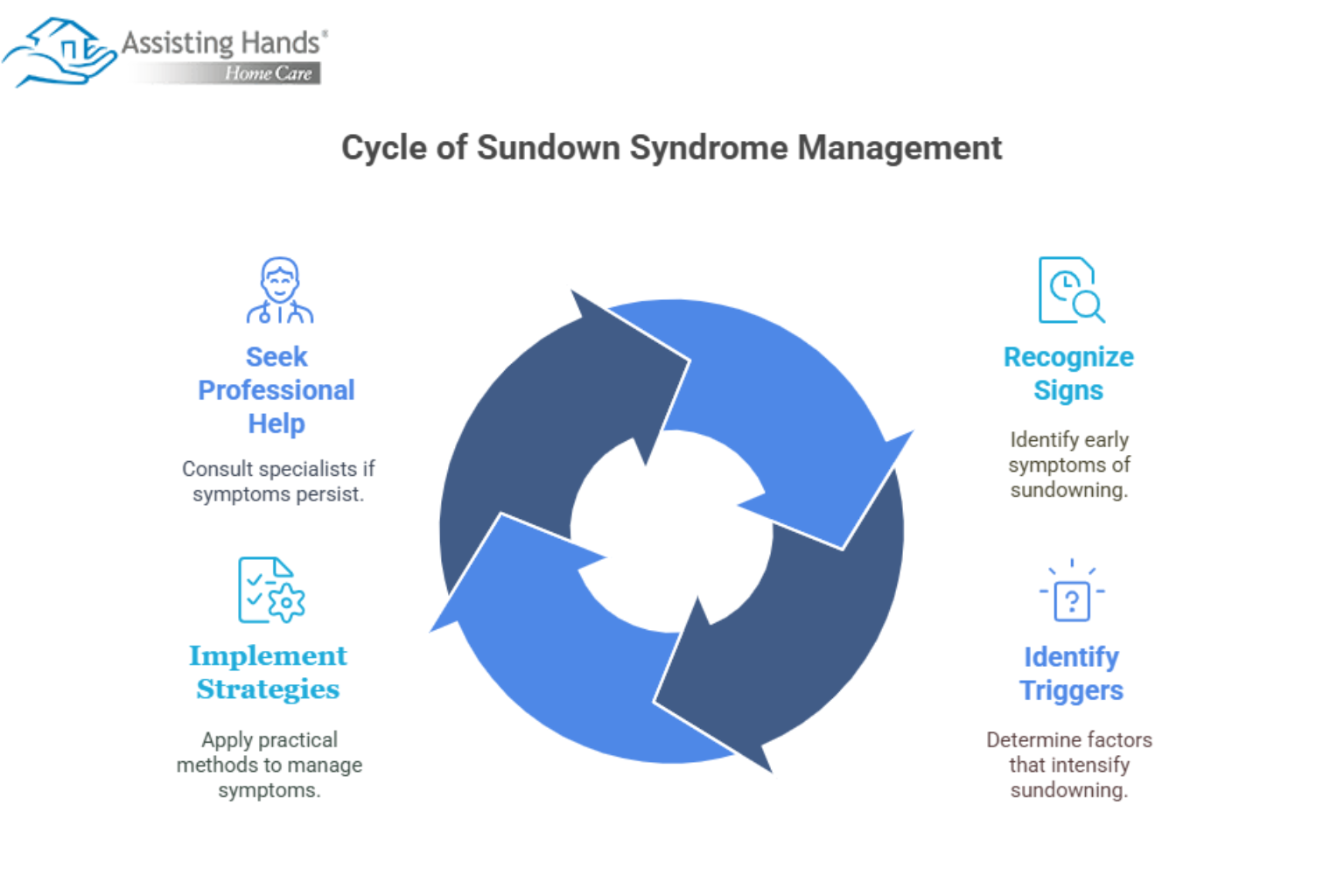
Table of Content
Sundown syndrome, also known as sundowning, is a common symptom individuals living with dementia experience, particularly in the late stages of the condition. It involves increased confusion, agitation, or restlessness during the evening or nighttime hours and can be challenging for both caregivers and their senior loved ones. Understanding the causes and implementing effective strategies are critical in managing this behavior and creating a peaceful environment.

What Is Sundown Syndrome?
Sundowning refers to a noticeable shift in behavior that occurs as the day transitions into evening. People with dementia may exhibit behaviors such as anxiety, irritability, pacing, yelling, or even resistance to care during this time. The exact cause of sundown syndrome isn’t fully understood, but researchers believe it may be triggered by changes in the internal body clock, environmental factors like dimming light, or fatigue from the day.
If your senior loved one has been diagnosed with a serious condition and needs help with tasks like meal prep, transportation, bathing, and grooming, reach out to Assisting Hands Home Care, a leading provider of at-home care families can trust. We also offer comprehensive care for seniors with dementia, Alzheimer’s, and Parkinson’s.
Recognizing the Signs of Sundown Syndrome
Caregivers must recognize the signs of sundowning early to address the issue effectively. Some common behaviors associated with sundown syndrome include:
- Increased agitation, restlessness, or pacing
- Verbal outbursts or yelling
- Disorientation or confusion about the time of day
- Difficulty sleeping or unwarranted energy bursts during evening hours
- Resistance to daily routines or care
These symptoms can disrupt the lives of both seniors and caregivers, making it crucial to take proactive measures when they occur.
Identifying Potential Triggers
Understanding what intensifies sundowning in individuals with dementia is a vital step in managing it. Some common triggers include:
- Lighting changes – The transition from daylight to artificial lighting can increase confusion.
- Overstimulation or fatigue – A busy day or an overload of activities can make it harder to wind down.
- Hunger or thirst – Changes in eating or drinking patterns during the day can impact mood in the evening.
- Unfamiliar environments – A new or unfamiliar space can escalate anxiety and confusion.
By observing and documenting when and how sundowning symptoms occur, you can better understand patterns and contributors to the behavior.
One of the most challenging tasks of helping an elderly relative age in place safely and comfortably is researching agencies that provide homecare services. Potomac families can turn to Assisting Hands Home Care for reliable, high-quality in-home care for aging adults. We offer 24-hour care for seniors who require extensive assistance, and we also offer respite care for family caregivers who need a break from their caregiving duties.
Practical Strategies to Manage Sundown Syndrome
Managing sundown syndrome requires a patient and structured approach. Below are some practical strategies to help caregivers reduce its occurrence and manage evening behavioral changes:
- Maintain a consistent routine
Following a daily routine stabilizes internal body clocks and provides a sense of familiarity for individuals with dementia. Try to keep meals, activities, and bedtime consistent to reduce confusion and anxiety.
- Ensure a calm environment
Minimize noise, disruptive activities, or overwhelming stimuli during evenings. Creating a quiet and peaceful environment can help your loved one feel more at ease as the day transitions to night.
- Use light therapy
Exposure to natural light during the day and adjustment of indoor lighting at dusk may regulate sleep patterns and reduce confusion. Consider using soft, warm lighting in the evening to create a relaxing ambiance.
- Encourage physical activity
Engaging your loved one in light physical activities earlier in the day can expend energy and reduce restlessness in the evening. Gentle exercises such as walking or stretching can be beneficial.
- Offer comforting activities
Redirect agitation with soothing activities. Reading, watching a calming TV show, or listening to relaxing music may ease agitation and encourage relaxation.
- Promote sleep hygiene
Establish a relaxing bedtime routine that includes dimmed lights, no caffeine or heavy meals late in the day, and comfortable sleeping arrangements to encourage restful sleep.
When to Seek Professional Help
While many individuals with dementia can benefit from these strategies, there are cases where sundowning symptoms persist or worsen despite consistent efforts. If this happens, consider consulting a healthcare provider or dementia specialist, who may recommend medications, therapeutic interventions, or tailored strategies depending on your loved one’s unique needs.
Caring for seniors with dementia can be challenging for family caregivers. Luckily, there is dementia care Potomac families can rely on. Professional dementia caregivers help seniors with dementia stay safe and comfortable at home by preventing wandering, providing cognitive stimulation, and assisting with household chores. Rely on the professionals at Assisting Hands Home Care to provide high-quality compassionate care for your loved one. Give us a call today to learn about our flexible in-home care plans.






